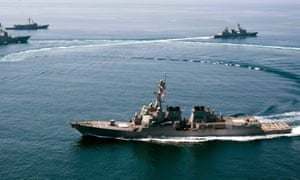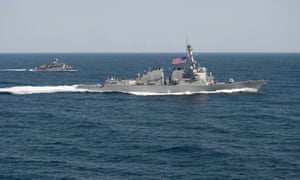Navigating Stormy Waters
"[The U.S. vessel entered Chinese waters] illegally and without the Chinese government's permission."
"The action by the U.S. warship has threatened China's sovereignty and security interests, endangered the safety of personnel and facilities on the islands and damaged regional peace and stability."
"[The U.S. should] correct its wrongdoing immediately, [not take further] dangerous and provocative actions."
"If certain parties continue to stir up trouble and create tension, then China may be forced to come to the conclusion that it is indeed necessary for us to speed up and strengthen relevant capacity building on the islands]."
Chinese Foreign Ministry spokesman Lu Kang
"You don’t need to consult with any nation when you are exercising the right of freedom of navigation in international waters.""[Such a challenge to a questionable sovereignty claim is] one of the reasons you have a navy — to be able to exert influence and defend freedom of navigation in international waters."
John Kirby, U.S. State Department spokesman
"That certainly includes the ability of our Navy to operate in international waters. This is a critically important principle, particularly in the South China Sea, because there are billions of dollars of commerce that flow through that region of the world every year — maybe even more than that — and ensuring the free flow of this commerce, and that freedom of navigation of those vessels is protected, is critically important to the global economy." Josh Earnest, White House press secretary
 |
| The USS Lassen conducts a trilateral naval exercise in May of 2015. Photograph: EPA |
 |
| USS Lassen sailed within 12 nautical miles of artificial islands built by China in the South China Sea, says Beijing. Photograph: US Navy/Reuters |
The intentions of the Americans cannot have come as a total surprise to President Xi Jinping since at a conference during his visit to the United States last month President Obama clearly stated that the United States was prepared to operate, fly or sail anywhere permissible by international law. For its part, China dispatched warships into territorial waters of the U.S. back in August when five Chinese vessels approached within twelve miles of the Alaska coast at the very time that Mr. Obama was in Alaska.
In May, a U.S. Navy surveillance plan skimmed over three of China's five artificial islands without approaching the 12-mile territorial exclusion zones. At that time, on that occasion, Chinese Navy radio operators had given warning to the Americans that they must leave the area. In contrast, when the five Chinese ships were inside the 12-mile territorial zone off Alaska, not a hair was turned, nothing was said, the world turned as it must.
In the negotiations ongoing between the Arctic states of Norway, Canada, United States, Denmark and Russia, each of the Arctic countries assembling scientific data to prove their territorial claims in the Arctic, China has expressed interest in being involved, although the Arctic is half a world away from its shores. That being the case, it would be difficult for Beijing to protest American interest in the South China Sea, where its allies, Vietnam, Malaysia, the Philippines, Brunei and Taiwan have competing interests to China's.
China stated that it had taken precautions to monitor the USS Lassen while it passed close by the Subi reef where its artificial island sits, the centre of a regional dispute over maritime territory and sea routes. A missile destroyer and a patrol boat delivered a warning to the Lassen; in response the vessel sailed on its course. The mission was completed "without incident" as the guided-missile destroyer, accompanied by Navy surveillance planes, went on its planned way.
Beijing had previously warned it would "never allow any country" to violate its territorial waters and airspace around the artificial islands it has constructed by dredging up sand from the ocean bottom to layer coral reefs and rocks which are ordinarily below sea level. By raising their level to construct small islands, Beijing claims the resulting islands are Chinese possessions, claiming territorial ownership extends to the entire seabed, and the air above it.
Just as Moscow had a Russian titanium flag planted on the floor of the Arctic, China has constructed runways and buildings on the series of artificial islands over reefs, while claiming there is no military dimensions planned for the outposts so distant from their own shores. When the incident had passed, China's vice foreign minister, Zhang Yesui, reamed out U.S. Ambassador to China Max Baucus, in a formal protest.
Subi Reef, once submerged at high tide, now is large enough to host an airstrip, since China began its massive dredging operation. A surveillance tower and multiple satellite antennae are visible through satellite images on the island. International law does not recognize rights to territorial waters around artificial islands. At the site of another such island, Fiery Cross reef, a Chinese airstrip is under construction. Designed, China claims, for civilian use, not meant to affect navigation freedom in the South China Sea. Yet.
In the negotiations ongoing between the Arctic states of Norway, Canada, United States, Denmark and Russia, each of the Arctic countries assembling scientific data to prove their territorial claims in the Arctic, China has expressed interest in being involved, although the Arctic is half a world away from its shores. That being the case, it would be difficult for Beijing to protest American interest in the South China Sea, where its allies, Vietnam, Malaysia, the Philippines, Brunei and Taiwan have competing interests to China's.
China stated that it had taken precautions to monitor the USS Lassen while it passed close by the Subi reef where its artificial island sits, the centre of a regional dispute over maritime territory and sea routes. A missile destroyer and a patrol boat delivered a warning to the Lassen; in response the vessel sailed on its course. The mission was completed "without incident" as the guided-missile destroyer, accompanied by Navy surveillance planes, went on its planned way.
Beijing had previously warned it would "never allow any country" to violate its territorial waters and airspace around the artificial islands it has constructed by dredging up sand from the ocean bottom to layer coral reefs and rocks which are ordinarily below sea level. By raising their level to construct small islands, Beijing claims the resulting islands are Chinese possessions, claiming territorial ownership extends to the entire seabed, and the air above it.
Just as Moscow had a Russian titanium flag planted on the floor of the Arctic, China has constructed runways and buildings on the series of artificial islands over reefs, while claiming there is no military dimensions planned for the outposts so distant from their own shores. When the incident had passed, China's vice foreign minister, Zhang Yesui, reamed out U.S. Ambassador to China Max Baucus, in a formal protest.
Subi Reef, once submerged at high tide, now is large enough to host an airstrip, since China began its massive dredging operation. A surveillance tower and multiple satellite antennae are visible through satellite images on the island. International law does not recognize rights to territorial waters around artificial islands. At the site of another such island, Fiery Cross reef, a Chinese airstrip is under construction. Designed, China claims, for civilian use, not meant to affect navigation freedom in the South China Sea. Yet.
 | |||||
| A satellite image from March showed work on an emerging artificial island at Mischief Reef, part of the Spratly Islands in the South China Sea. China has been turning submerged reefs into islands to bolster its territorial claims. Credit Center for Strategic International Studies, via Digital Globe |
Labels: Aggression, Challenge, China, Controversy, South China Sea, United States

<< Home